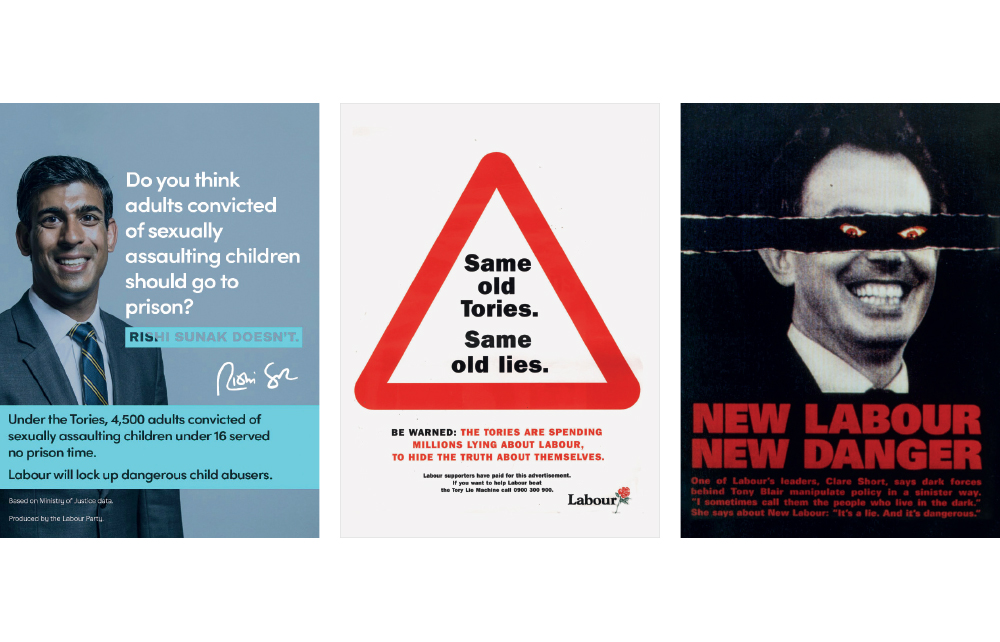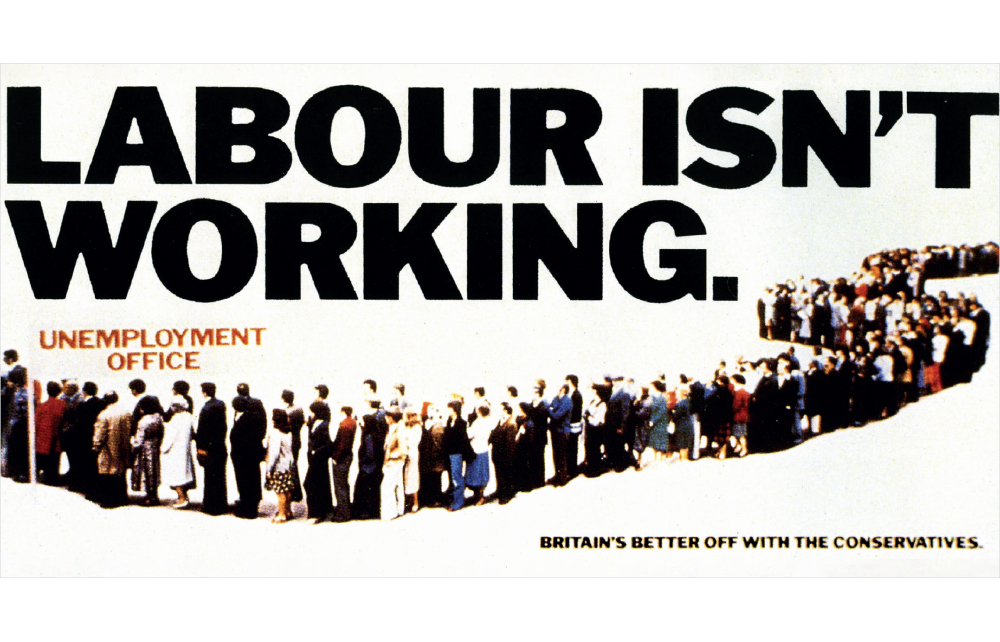When I was writing ads for Labour’s 1997 election campaign, I’d never have presented an idea as factually, creatively and strategically wrong as Labour’s recent ‘attack ad’ on Rishi Sunak. If I had, I’d have been the one under attack for failing to understand the simple principles of advertising.
What you need when writing any ad is calm, dispassionate advocacy rather than silly, partisan evangelism
Let’s start with the first and most obvious one: ‘Don’t tell lies.’ Labour’s ad suggests that the Prime Minister would be quite happy to let sex offenders go unpunished. Nobody – not even the person who wrote it – believes this to be true and it’s the reason the ad could only appear online. If the same claim were made on TV, on radio or in print, it would have been rejected because it’s neither legal, decent, honest nor truthful.
A second principle, particularly with something as emotive as politics, is: don’t allow your ads to be written by zealots. I assume this is what must have happened with Labour’s ad. I quite liked Tony Blair, but no more than I liked Heinz Baked Beans, Birds Eye Fish Fingers or any one of hundreds of other products that I’ve tried to persuade people to buy.
What you need when writing any ad is calm, dispassionate advocacy rather than silly, partisan evangelism. Before you begin, you need to acknowledge and tackle your product’s weaknesses and your competition’s strengths, so your ad can then highlight your product’s strengths and your competition’s weaknesses. Labour’s ad failed on that third principle. It didn’t highlight, for example, Keir Starmer’s strengths, which conveyed the impression that he doesn’t have any. Instead, the ad shows a party blinded by a visceral hatred of ‘the Tories’, which they mistakenly assume everyone shares. That mistake made them lose sight of their competitors’ main strength: Sunak’s personal popularity.

And this is where Labour failed on a fourth principle – make sure you understand the people you’re talking to. Sunak is increasingly seen as a decent, competent man working hard to repair the damage and chaos of his two predecessors. Attack the government by all means but to attack the PM personally, especially with something that isn’t true, was an error.
It’s an error that Labour would never have made in 1997. The party understood then that simply bashing the Tories would not be enough. They were keen to give reasons for people to vote for Labour, not just against the Conservatives.
The brief back then was ‘All the benefits you currently enjoy and then some’. In 1997, the economy was in pretty good shape, so we were encouraged to co-opt that feelgood factor and cunningly make it seem as though Labour was responsible for it. We then hammered home the idea that it was time for a change, and Cool Britannia, because ‘Things Can Only Get Better’.
On Labour’s 1997 election campaign, I remember invoking the Tories’ famous ‘Labour isn’t working’ poster for another poster which questioned the Conservative government’s own record on unemployment. Our poster simply said: ‘If the government’s policies are working, how come two million people aren’t?’ Needless to say, the Guardian loved it.
In Blair, Labour seemed to have a visionary leader with courage, conviction and charisma – three qualities not readily associated with Starmer. So despite a healthy – though diminishing – poll lead, Labour now look like a much less attractive proposition. Telling lies about Sunak has only made them look worse, which is why it’s more important than ever for them to accentuate the positives. But that’s exactly what their ad failed to do.
Compare the nasty negativity of 2023 with the honest positivity of 2007: Labour ran a very simple but effective poster when Gordon Brown became prime minister. There was a picture of him in a sober suit and Labour-red tie, and the headline said: ‘Not flash, just Gordon.’ And if you are going to attack the opposition, at least have the wit to do it with a little bit of humour. The Tories’ now iconic ‘Demon Eyes’ poster depicted Blair with the eyes of a devil stripped in to match his maniacal smile. ‘New Labour. New Danger,’ it warned. Blair still went on to win a landslide, but that image and its association with evil was never forgotten, especially in the aftermath of the Iraq war. Also memorable was the Scottish Conservatives’ poster showing Alex Salmond with a miniature Ed Miliband poking out of his breast pocket. ‘Vote Conservative’ were the only words required.
So how should the Tories respond to this latest attack ad from Labour? They could easily hit back and go for Starmer personally. Just take any picture of him looking dull and uninspiring, use the same one every time and simply alter the headline. Start with: ‘As a woman, could you really vote for a man who can’t define what that means?’ Then maybe look at Starmer’s own record regarding sex offenders: ‘Who was the Director of Public Prosecutions when it failed to prosecute Jimmy Savile?’ They should be honest enough to acknowledge their own shortcomings but also give the electorate something to think about: ‘How much worse would things have been under Lord Lockdown?’ (That nickname, by the way, might stick.) Then perhaps move on to a picture of Jeremy Corbyn with a different headline: ‘Keir Starmer wants you to vote for him this time. But who did he want you to vote for last time?’ They’d also be wise to make each headline a question. This leaves that vital gap for people to decide for themselves. It also means that, unlike Labour, the Tories can’t be accused of telling lies.
Attack the government by all means, but attacking the PM with something that isn’t true was an error
Not that Labour seem too bothered about these accusations. As one senior source involved in their campaign so cynically put it: ‘Mission accomplished. We’ve dominated the news agenda and started a serious conversation about the Tories’ record on crime.’ Mission accomplished? It’s a mistake to believe the old lie that ‘all publicity is good publicity’.
A year from now, if the polls start tilting in their favour, the time will be right for the Tories to unleash some attack ads of their own. If those ads are good, they could win the election surprisingly comfortably. To do so, though, they’ll have to learn from the mistakes of the opposition and prove that they understand how to get their message across. Because if a prospective government doesn’t even understand the basic principles of advertising, how can we be sure that they understand the principles of anything?
But my detached, disinterested advice for the Tories right now would be to do absolutely nothing. The current force of the backlash against Labour’s attack is doing all the work for them. If Sunak can keep repairing his party’s reputation, he could make Labour look weak and desperate. Especially if he subtly re-brands himself as the young, fresh face of the ‘New Conservatives’. After all, in 1997, the concept of ‘New Labour’ worked like a charm.






Comments